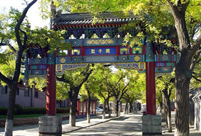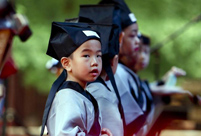 Global ambassadors of ecotourism gather in Nanjing
Global ambassadors of ecotourism gather in Nanjing
 Taiwan woman marries into Kazak family, 100 sheep plus a flat as dowry
Taiwan woman marries into Kazak family, 100 sheep plus a flat as dowry
 College girls take graduation photos under water in Chongqing
College girls take graduation photos under water in Chongqing
 Cartoon: Xi and football
Cartoon: Xi and football
 Chinese influence sweeps ROK
Chinese influence sweeps ROK
 Post-90s beauty boxer grapples four men
Post-90s beauty boxer grapples four men
 3,000-year-old tea town through lenses
3,000-year-old tea town through lenses
 22 archaeological sites along Silk Road in China
22 archaeological sites along Silk Road in China
 Football babies, Samba dancers embrace 'World Cup'
Football babies, Samba dancers embrace 'World Cup'
 Beautiful scenery along China’s Grand Canal
Beautiful scenery along China’s Grand Canal
BEIJING, July 6 -- July 7 is an anniversary that should be remembered by both Chinese and Japanese.
Seventy-seven years ago, at Lugou Bridge, known as Marco Polo Bridge to the Western people, Japanese troops attacked Chinese defenders in the nearby fortress town of Wanping, marking the beginning of the eight-year Anti-Japanese War.
Civilians were killed by gunfire, bombs, gas and biological weapons; women were raped; forced laborers were tortured to death.
It was a devastating tragedy not only for China, but also for Japanese people.
Ignoring objections from peace lovers at home, warmongering fascists initiated the war, leaving Japanese soldiers to shed their blood away from their motherland and women and children deserted back home. Those people who provoked the war marked their own country with humiliation in history.
What's more, 77 years later, the Japanese government still fails to introspect on what it did in the past and cherish the current peace.
Prime Minister Shinzo Abe's cabinet endorsed a reinterpretation of its pacifist Constitution on Tuesday for the right to collective self-defense, the latest move in challenging the international bottom line. A Japanese person even set himself alight in protest.
From the slapstick of the "nationalization" of China's Diaoyu Islands by the former Japanese government, to Abe's ridiculous visit to the Yasukuni Shrine and to the pacifist Constitution reinterpretation, right-wingers in Japan have initiated a series of provocations.
War is hell, but there are always devils who try to spark war and trample peace under foot.
Born in an island country with limited natural resources, Japanese people are respected for their diligence and energy-saving awareness. However, there are always a small number of people who attempt to loot the resources of other countries by way of invasion, bringing catastrophe to neighbors including the Korean Peninsula, India, Vietnam, the Philippines and China.
Decades have passed. With the common efforts of government leaders and civilians who cherish peace, China and Japan have greatly strengthened economic ties and cultural exchanges by putting hatred behind them. But some in Japan are now always trying to disturb the international postwar order by ignoring history, something no peace lover in either country wants to see.
China has a deep-rooted culture of seeking peace and expects the Abe government to stop its provocations. Otherwise, they will have to take their medicine.
 Featured hutongs in Beijing
Featured hutongs in Beijing Separate college entrance exam
Separate college entrance exam Flash mob dance
Flash mob dance Picturesque scenery of Ghost City
Picturesque scenery of Ghost City Children attend First Writing Ceremony
Children attend First Writing Ceremony Female master poses for graduation photos with son
Female master poses for graduation photos with son Silk Road, China's Grand Canal listed as World Heritage Sites
Silk Road, China's Grand Canal listed as World Heritage Sites PKU students imitate famous paintings in real-person photos
PKU students imitate famous paintings in real-person photos Chinese 'Slumdog Millionaire'
Chinese 'Slumdog Millionaire' Islands in S. China Sea better shown on new vertical atlas of China
Islands in S. China Sea better shown on new vertical atlas of China Girl takes father’s portrait to travel the world
Girl takes father’s portrait to travel the world Images of Xi'an: Part one
Images of Xi'an: Part one In Pictures: Female fans of World Cup
In Pictures: Female fans of World Cup Top 20 hottest women in the world in 2014
Top 20 hottest women in the world in 2014  China's top 10 representative architectures
China's top 10 representative architecturesDay|Week|Month